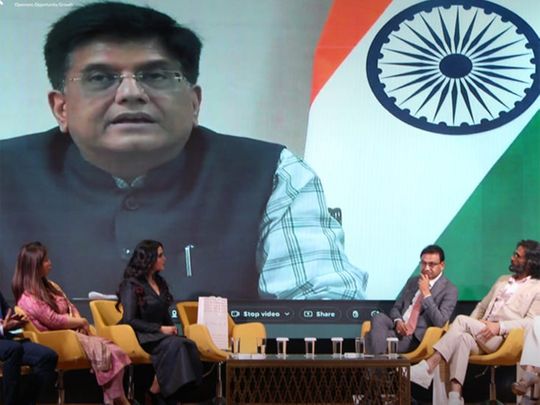
Dubai: India is moving towards becoming the fastest growing green economy of the world. That’s according to Piyush Goyal, India’s commerce minister.
Addressing the seminar ‘Only One Earth - A Discussion On Environment’ at the India pavilion at Expo 2020 Dubai, Goyal said: “While we are proud to be the fastest-growing economy in the world, we hope to become the fastest-growing green economy across the planet.”
The session, organised in collaboration with Bhamla Foundation, was aimed at raising awareness and the need to safeguard the environment, in line with the annual global theme laid out by the United Nations Environment Programme, ‘Only One Earth’, for the World Environment Day 2022.
Goyal said that the Indian pavilion had so far recorded 1.2 million visitors, making it one of the most visited pavilions in the six-month long event. “The pavilion is a perfect example of bringing sustainability into action. It has been constructed on principles of water and energy conservation and we are focusing on recycling in a big way and hosting a wide range of discussions around biodiversity, wildlife conservation, climate action and renewable energy,” said Goyal.
The session was also attended by eminent personalities from UAE and India including social activist Amruta Fadnavis, Royal Prince of Udaipur Lakshyraj Singh Mewar, singer Shantanu Mukherjee, and Indian actor Suniel Shetty.
“As a leading agri-producer, we are taking significant efforts to promote biofuels. Now, food grains waste and sugarcane are converted into ethanol in a big way, with the ethanol blending programme making rapid strides,” said Goyal. “It used to be 1 per cent then this year between 9-10 per cent and next two years we hope to take the blending to 20 per cent, to reduce our dependence on import of crude oil and make our petrol vehicle more sustainable and support efforts towards net-zero by 2070.”
India, which is looking to reduce its dependence on oil imports, has promised to cut its emissions to net zero by 2070. “We hope to achieve a non-fossil based energy capacity of 500 gigawatts by 2030 - it’s one of the most ambitious programmes that any country in the world has embarked upon,” said Goyal.
When it comes to the domain of climate change, India’s private sector is also an active participant. “We have over 5,000 startups registered with us today, who are working on sustainability, (and) we have seen nearly $2 billion flowing into climate tech startups in the last few years.”
A recent surge in oil prices has threatened to upend India’s economic recovery following a two-year pandemic. Brent crude – the international benchmark for oil – touched $130 a barrel for the first time since 2008 due to the ongoing Russia-Ukraine conflict. India is the third largest crude oil importer in the world, behind China and the US.












